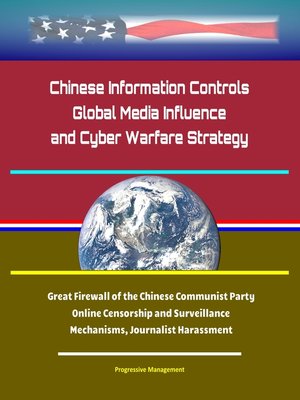Chinese Information Controls, Global Media Influence, and Cyber Warfare Strategy
ebook ∣ Great Firewall of the Chinese Communist Party, Online Censorship and Surveillance Mechanisms, Journalist Harassment

Sign up to save your library
With an OverDrive account, you can save your favorite libraries for at-a-glance information about availability. Find out more about OverDrive accounts.
Find this title in Libby, the library reading app by OverDrive.



Search for a digital library with this title
Title found at these libraries:
| Library Name | Distance |
|---|---|
| Loading... |
This authoritative report has been professionally converted for accurate flowing-text e-book format reproduction. It covers a public hearing of the U.S.-China Economic and Security Review Commission on China's Information Controls, Global Media Influence, and Cyber Warfare Strategy. At the hearing, the Commissioners heard from the following witnesses: Xiao Qiang, Adjunct Professor, School of Information, University of California, Berkeley; Margaret Roberts, Assistant Professor of Political Science, University of California, San Diego; Sophie Richardson, China Director, Human Rights Watch; Dan Southerland, Former Executive Editor, Radio Free Asia; Shanthi Kalathil, Director, International Forum for Democratic Studies, National Endowment for Democracy; Sarah Cook, Senior Research Analyst for East Asia, Freedom House; Chris C. Demchak, Grace M. Hopper Professor of Cyber Security and Director, Center for Cyber Conflict Studies (C3S), U.S. Naval War College; and James A. Lewis, Senior Vice President, Center for Strategic and International Studies. The subjects covered included the mechanisms the Chinese government uses to censor information in China, China's repression of journalists, China's influence on media in the United States and other countries, and China's views of norms in cyberspace. It specifically examined the effectiveness of Beijing's information control mechanisms, the methods employed by Internet users in China to circumvent these mechanisms, and Chinese acquisitions of U.S. film studios and cinemas. Additionally, this hearing explored Beijing's view of Internet sovereignty and Chinese computer network operations doctrine.
This compilation includes a reproduction of the 2019 Worldwide Threat Assessment of the U.S. Intelligence Community.
The Chinese Communist Party, as most people know, relies on what is known as the Great Firewall, an assortment of sophisticated electronic censorship and surveillance mechanisms, to monitor online activity within China's borders. It prevents web users within China from accessing foreign ideas, which the Party regards as an ideological threat. It also allows the CCP to maintain effective control over the news by blocking sensitive stories. Curious web users in China have learned to "climb the Wall" and access forbidden information, but the Party has increasingly made it more difficult to do so. In addition to maintaining a firm grip on what ideas are allowed to penetrate China's borders, the Chinese government assiduously engages in what it calls "public opinion guidance," using state-sponsored content spammers to intervene in online discussions in order to distract from sensitive topics. The activities of these spammers were not previously well understood, but thanks in part to leaked internal communications from a local Chinese propaganda department, and to the work of our witnesses, recent research has been able to shed more light on this issue.







